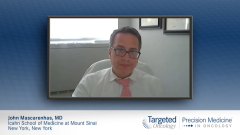
Improving Survival Rates in Myelofibrosis
Ruben Mesa, MD, and John Mascarenhas, MD, discuss whether therapies with a clinically meaningful impact on myelofibrosis may have a survival advantage for patients.
Episodes in this series

Ruben Mesa, MD: It's interesting you brought up imetelstat. With the data you guys performed from your analysis, it suggested that there was an improvement in survival, but that that improvement in survival was not unnecessarily associated as part of a better quality of response and spleen or symptoms. We've been seeing more things talking about survival such as ruxolitinib. You and I both have presented many times that we feel ruxolitinib likely improves survival in the frontline setting in MF [myelofibrosis]. The COMFORT studies, real-world evidence have really been corresponding to this. I presented at this year's EHA [European Hematology Association] and ASCO [American Society of Clinical Oncology] meeting that data from many of us looking at the long-term outcomes of the SIMPLIFY-1 and SIMPLIFY-2 studies suggesting that the achievement of transfusion independence was associated with a survival advantage. Claire N. Harrison, MD, FRCP, FRCPath, presented, on behalf of many of us, data from the JAKARTA and JAKARTA2 studies suggesting an improvement in survival. You presented a suggestion that 1 dose of imetelstat probably improved survival over the other one, enough to leave that to be a key end point in terms of the phase 3 trial. So I do think that survival has become much more on the radar for myelofibrosis. I also think we're all still working as a field to try to understand, well, why is it exactly patients are living longer? Is it having a response? Is it tied to 1 type of response? Does any therapy that has a significant response impact survival? I do think there are several drugs that we don't have that data yet, but that I could believe that a survival event would occur. For example, it will not take much to convince me that pacritinib has a survival advantage in patients with marked thrombocytopenia based on our experience. Likely ruxolitinib, momelotinib, and fedratinib have survival advantages. But what are your thoughts, John? Do you think any therapy that has a meaningful impact on MF may have a survival advantage? Obviously, all things to be proven drug by drug, but sometimes, proving them in the setting of trials is trickier than it sounds.
John Mascarenhas, MD: I totally agree with you. I think that potentially any or most drugs that can have a significant impact on the disease process has the potential to correlate and associate with survival benefit. I 100% agree that it's not the actual reduction in bone marrow fibrosis that's likely leading to patients having an improved survival. Rather, it's a reflection of biomarker that suggests there's some disease modification that then is translated to survival benefit. Similarly, we've seen this with ruxolitinib and spleen reduction. So Srdan Verstovsek, MD, PhD, and others have published nice data that correlates the degree of spleen volume reduction with overall survival. I've never really believed that it was literally the smaller the spleen, the longer you're going to survive, but it's really a reflection of hitting the target more effectively and the benefits associated with that.
The end result may still be in most of those cases, if you can modify the disease and perhaps change the progression of the disease, and you're going to ultimately improve the outcomes. To me, that's very exciting that we're even sitting here talking about outcome measures like survival because we weren't really doing that for quite some time. As you pointed out, I don't think it's particularly ruxolitinib, but ruxolitinib first showed that there is a survival benefit simply with JAK inhibitor therapy. As you mentioned before, a lot of the prognostication systems that were derived from retrospective analyses probably don't really reflect the survival of the patients we treat today because we have these JAK inhibitors available. It's an exciting time to be involved in the care of these patients because we are looking to improve quality of life and extend that quality of life. So, these are very different conversations than we would have had maybe a decade ago.
Transcript edited for clarity.







































